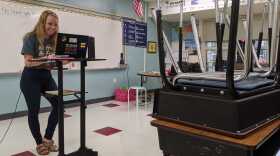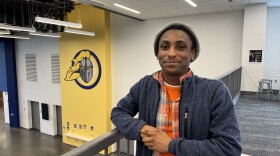When the Durham Public Schools' board of education voted to remain in virtual learning for the rest of the school year, Rhiannon Giles' reaction was complicated.
"I think they made the right decision, but also I cried," Giles said.
She's the mother of two students at Club Boulevard Elementary, with a daughter in fifth grade and a son in kindergarten.
With COVID-19 numbers rising, more school districts are extending their time in remote instruction. Although Gov. Roy Cooper allowed school boards to consider sending elementary students back to in-person school full time as early as October, more than a dozen school districts have chosen to keep all their students in remote learning since last March. One district, Durham Public Schools, has already announced it will spend the entire 2020-2021 school year in virtual learning.
Durham families and educators have mixed feelings about continued life in remote school.
"I think Durham's done a great job and done the best they can, but at the same time, virtual schooling is really hard on everybody," Giles said. "I have a lot of luck and privileges and it's still extremely difficult. Like I still consider it a good day if nobody cries."
Giles said she's lucky because she can work from home, and being divorced means she and her ex-husband alternate weekdays with the kids. That also means when she has them, she's single-parenting while trying to work.
"It's beyond stressful," Giles said. "Frequently, I'll have both kids asking me questions at once while I'm also trying to do a Zoom call for work."

That kind of stress is familiar to families whose young kids are in virtual school, but Giles feels like there's no right answer to the school reopening debate.
"I think there are great arguments for sending kids back, and I think there're great arguments for keeping them at home," Giles said.
The Durham school board's main argument was that community spread of the virus is too high. They decided that until the percentage of positive COVID-19 tests in the county dropped below 4% and remained there for two weeks, schools would remain online. When that didn't happen this winter, the board decided to stay virtual all year.
That decision-making process has won praise from some parents and educators, like fifth grade teacher Kelsey Wasser at Lakewood Elementary.
"I am really grateful to DPS for really using science and basing their decisions on measurable metrics," Wasser said.
Wasser is glad to be teaching virtually for the health and safety of the community, but she's concerned about losing time with her students.
"Stamina wise, they can't be on the computer for the amount of hours that they're in person learning. Like, I can't do it. You can't do it. Ten year olds can't do it. So time has to be limited," Wasser said.
In virtual school, Wasser gets about two hours and 15 minutes with her students a day. That's less than half the time she spent in class before the pandemic.
"I don't feel like I have enough time in person to teach them everything that I want to teach them," Wasser said.
She's concerned about how that will compound over the full year. This idea of 'learning loss' often comes up in school reopening debates.
Wasser said she's less concerned with how her students will score on their next end-of-grade exam, and more about longterm effects.
"Am I preparing them to be successful in middle school and to be successful long term in the areas they need to be successful?" Wasser asks.
Her colleague Jennifer Campbell, a third grade teacher at Lakewood Elementary, says she's worried the achievement gap could widen for her students of color. Campbell says she's especially concerned about how the pandemic exacerbates the on-going effects of racism on her Black and brown students.
"My biggest concern right now is socially and emotionally, how are they?" Campbell said. "I worry about the effects of this pandemic will have on these beautiful Black and brown babies. I worry about them having access to all the things that they need."
Campbell thinks about how her students witness their families' stress on top of racism portrayed in daily news.
"I'm not in their shoes, and I don't know what it's like to be eight or nine, and having to learn virtually," Campbell said.
Parents Emily and Calvin Brown try to talk to their daughter Annmarie about what it's like for her. She's a kindergartner at Eno Valley Elementary.

"She has commented that she hasn't made any friends," Emily said. "When she gets to go to school, she's excited to eat lunch with her class, and she's excited about having recess."
Despite those sacrifices, the Browns think the school board made the safest choice. Calvin says he has someone in mind who he is particularly concerned about.
"It's just a risk thing. I mean, my dad is high risk right now," Calvin said.
He's glad he doesn't worry about his daughter putting his dad at higher risk if she was going into school.
Teacher Kelsey Wasser was pregnant most of this school year, and Jennifer Campbell's daughter has sickle cell anemia. While sometimes it feels like there's no perfect choice, they're glad the school board chose the path that was safest for their loved ones.










